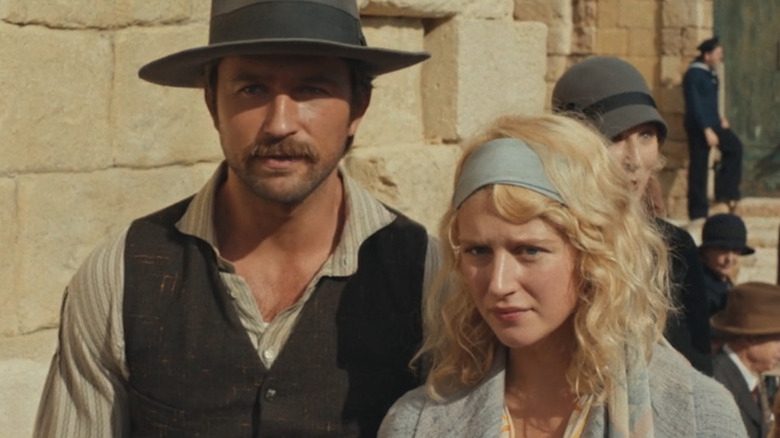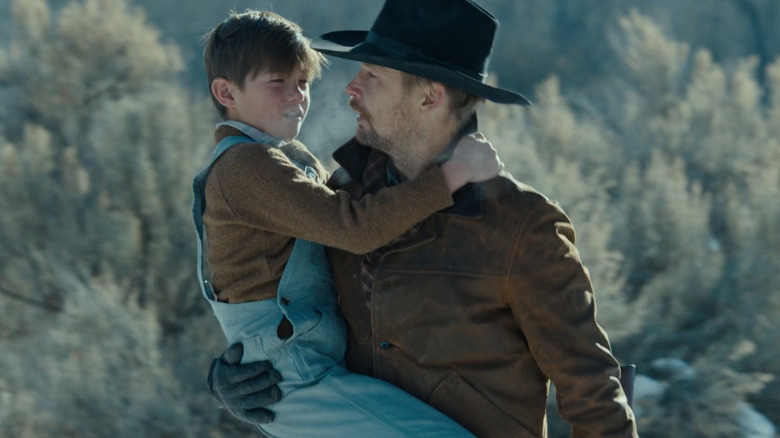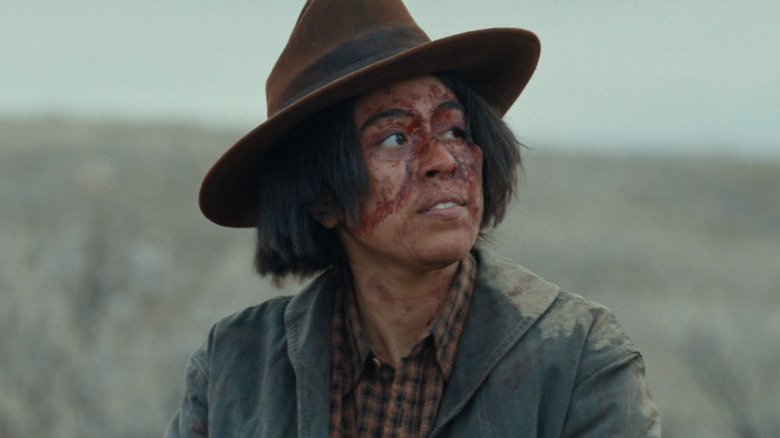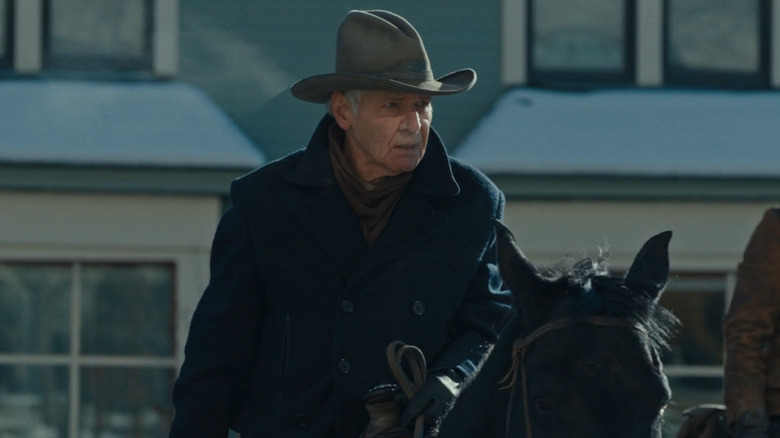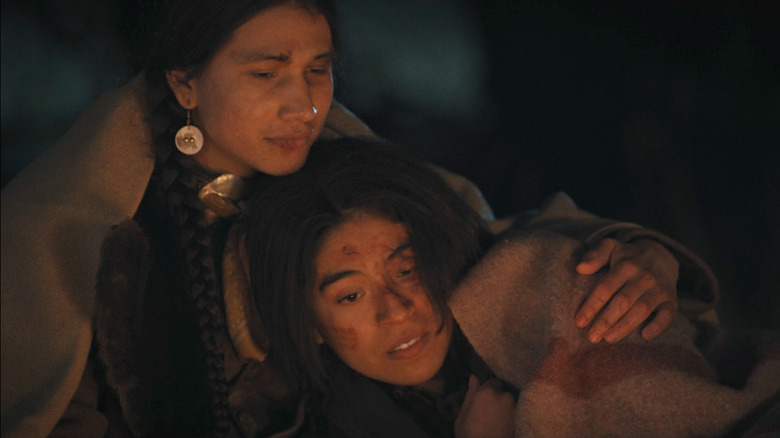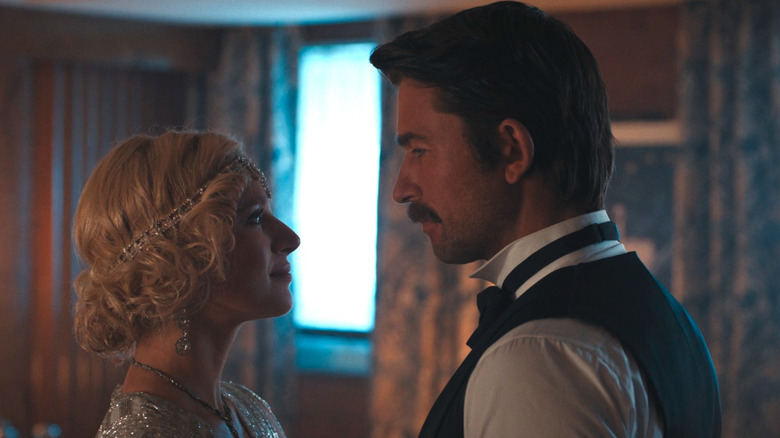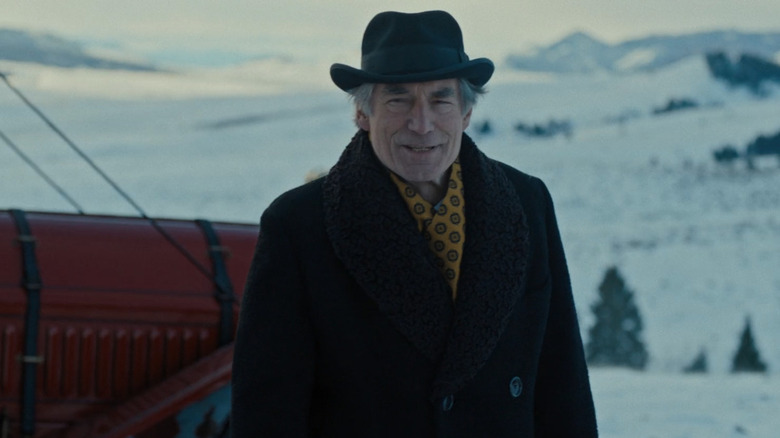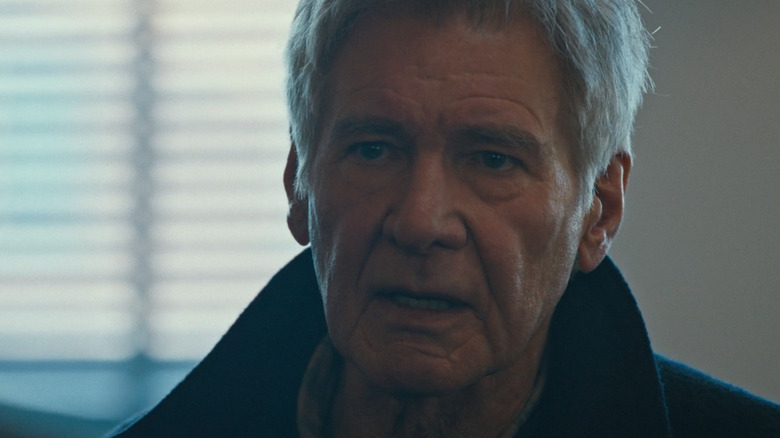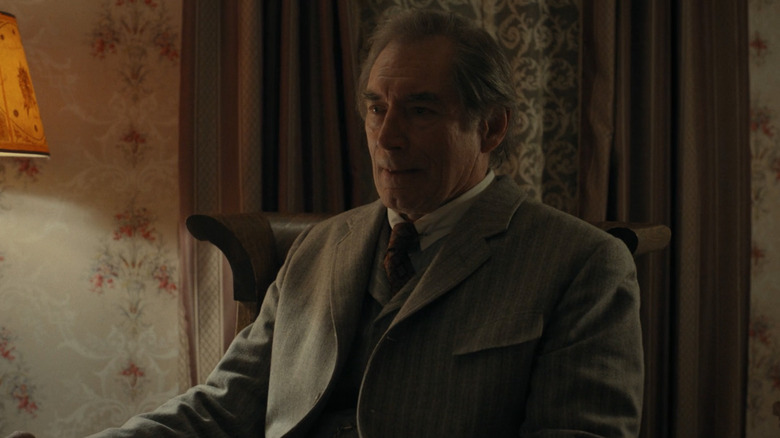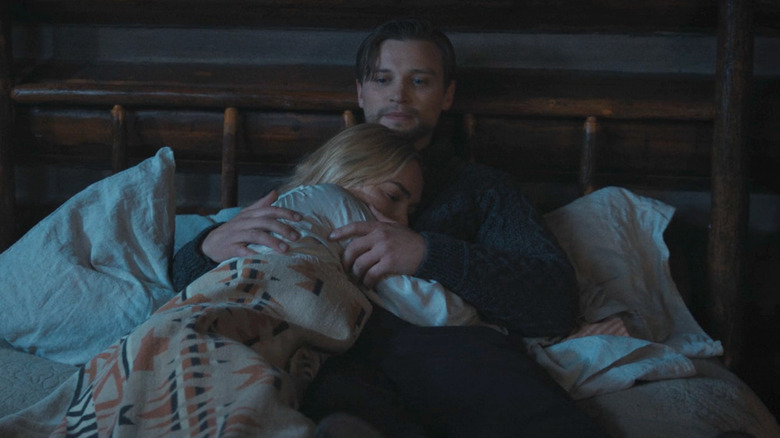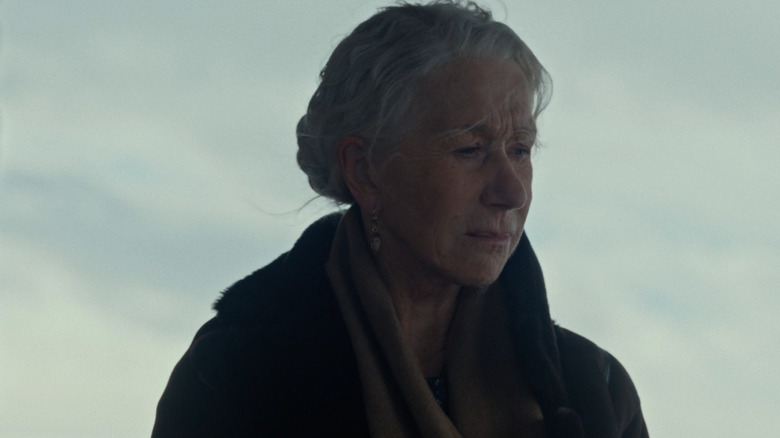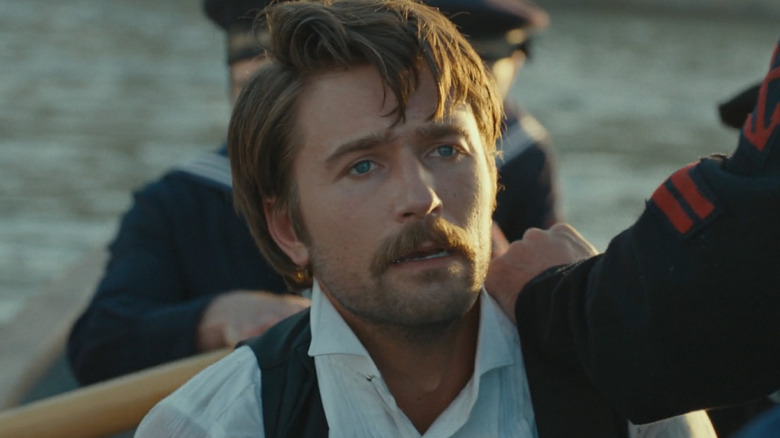The Ending Of 1923 Season 1 Explained
The "Yellowstone" spin-off "1923" came with lofty expectations. After the period Western starring Tim McGraw, Faith Hill, and Sam Elliott titled "1883" a year earlier received critical acclaim, the pressure was on to see if the franchise could deliver a worthy follow-up. But with Hollywood heavyweights Harrison Ford and Helen Mirren leading the way, fans had faith that they were in for something special.
Premiering at the tail end of 2022, the series shows a period in Montana when the Wild West is slowly giving way to the modern world. It is now the job of new family patriarch Jacob Dutton (Ford) to see his family into the 20th century and protect their home from new rivals and enemy agents. We're also introduced to Spencer Dutton (Brandon Sklenar), whose fate lies not in Montana, but in Africa, where he meets a beguiling English woman before beginning a harrowing journey back to the United States.
A story involving a Native American girl who escapes the cruelty of a Catholic boarding school shines a light on the plight of Native American school children in the era. As the drama heats up, deadlier dangers threaten to end legacies before they can begin. Now that the season finale has come and gone, it's time to take a look back at "1923" and explain what it all means.
Family is everything
If fans of Taylor Sheridan's work haven't noticed by now, one of the prevailing themes is the importance of family. From "Hell or High Water," one of the first feature films he wrote, to Sylvester Stallone's crime comedy "Tulsa King," Sheridan's stories have almost all revolved around the power and pull of family. Nowhere is this truer than in "Yellowstone" and its spin-off "1923."
This theme runs most obviously through the story of Jacob Dutton and his clan, and how there is nothing more that motivates the staunch patriarch than his love of his kin. He does everything for them and them alone. But in the season finale, "Nothing Left to Lose," this theme runs in a new direction with the introduction of ranch leader Zane Davis (Brian Geraghty) and his family, as we learn he is married to an immigrant. We learn how important his family is to him, and how Jacob's respect for family extends to his ranchers.
The finale also makes clear that families come in all manner of shapes and sizes, and it doesn't matter what shape it may be — family is all that matters. Tragically, injustice abounds in "1923" as much as it does in the real world when the law comes to arrest Zane's wife for the crime of marrying a white man. At the same time, Jacob's family is falling apart, with his new niece miscarrying a pregnancy, and the family home on the verge of being taken by Donald Whitfield (Timothy Dalton).
Freedom must be fought for
It's generally assumed that freedom — the freedom to pursue your dreams and live the life you choose for yourself — should be the inherent right of all people. But we have all likely found it's never quite that simple, and "1923" goes further. By the end of Season 1, the characters in the series can see how freedom sadly is not always guaranteed.
On the reservation, Teonna's (Aminah Nieves) fight for freedom forces her to kill, pushing back against the oppression she faces after being taken from her family and forced into a Catholic boarding school. In their attempt to take away her identity through cruelty and torture, they inadvertently unleash her inner warrior. Now, if she wants to live free, she must fight harder than ever before, alongside her father (Michael Spears), who has come to her rescue, and with a new love, Pete Plenty Clouds (Cole Brings Plenty), as they look to start a new life together while on the run from America's lawmen.
The Duttons, meanwhile, face their own fight for freedom. As a new day in America dawns and more and more laws begin to strip them of their sovereignty, Jacob Dutton is forced to fight fire with fire. That may mean a fight in the fields with guns and guts, or it might mean a battle in the boardroom, facing off against ruthless businessmen who would use guile and cunning to take from him everything that he's built.
Change is inevitable
The world of the Wild West is already nearing its end not long after the events of "1883," as pioneers begin building up the West and the law starts to make its way to the frontier. By the era of "1923" however the mountains of Montana are firmly becoming part of the modern world. Though they are still well behind the big cities like New York and San Francisco, we've seen through the course of the season that automobiles are slowly taking over for horses, and electricity is finally finding its way into the home.
Jacob Dutton has been resistant to such change, though his wife Cara (Mirren) seems happy to have a washing machine to make her household chores easier. But in the finale, we see the truest extent of modern changes, as horse hitches in the city have been removed from the street to make way for automobile parking spaces, and new 20th century laws allow bankers and tycoons to take away a person's house and home through shady business deals.
Jacob Dutton, a man born before the Civil War, is a remnant of an old world where problems were solved with a fist or a gun, and, somewhat paradoxically, neighbors respected each other's livelihoods and cared for their community. Likewise, Teonna's people, who once roamed free and loved the land, now have modern American laws dictating their way of life. Change is inevitable, and if "1923" tells us anything, it's that while change can be good, it can also be terrifying, and can be used to harm others when controlled by the wrong people.
There is no later, there is only now
With Teonna on the run from the law in the Season 1 finale "Nothing Left to Lose," she's been forced to kill several of her pursuers and is discovered by her father. With a U.S. Marshal on their tail, they're forced to flee to Wyoming where they hope to join a new clan of Comanche down south and begin a new chapter of their lives. But with so much turmoil in her young life, Teonna defies her father and begins a romance with Pete Plenty Clouds. Because if her experiences this season have taught her anything it's that tomorrow isn't guaranteed.
These lessons have also been learned by the Duttons, who are ready to take matters into their own hands, rather than to wait out the return of Spencer. They can no longer afford to waste precious time in the hopes that he will imminently return to save them. With Donald Whitfield at their door ready to take the land beneath their feet and steal the Yellowstone Ranch, and Banner Creighton (Jerome Flynn) ready to see them all dead in a hail of gunfire, waiting is not an option. Prosperity and survival depend on taking action now, because there may not be a later.
This is a wisdom that Spencer and Alexandra (Julia Schlaepfer) learn earlier this season. Like Teonna and Pete, they jump headfirst into a romance because the dangers of life allow no room for patience. They were right not to waste the time, as they've been forced apart by fate by the end of the season.
The only way out is through
In the season finale, Spencer and Alexandra finally set sail for American shores, but are forced to deal with a new problem. This time, though, it's not a deadly squall or shipwreck, or even an African lion, but the spite of a spurned lover — Alex's former husband-in-waiting Arthur (Bruce Davison). In the finale it's revealed that Arthur is more than just Alex's ex-fiancé, but the Earl of Sussex, whose father is a prince in the line of succession.
With all three forced together during their voyage on the RMS Majestic ocean liner, Alex is initially determined to avoid a confrontation by staying in her cabin for the entirety of their trip. But when frustrations with their situation boil over, Alex and Spencer agree that the only way to deal with their problems is head on. Unfortunately, this leads to a new crisis, as Arthur challenges Spencer to a duel on the deck. Spencer wins the day but is forced to throw Arthur overboard when the bitter ex-lover pulls a pistol, leading to the hunter's arrest and expulsion from the ship, threatening to separate him from his wife forever.
But this is by no means a lesson Spencer and Alex alone must learn, as Teonna and Jacob Dutton must force their way through their own problems. Teonna learns to accept that there is no avoiding a fight, while the Duttons realize that the only way to save their ranch may be to take their fight directly to the enemy.
Wealth does not equal honor
More than any series yet, "1923" appears to be Taylor Sheridan's way of making crystal clear how he feels about the rich and powerful. More than once he's shown his villain — industrialist and mining magnate Donald Whitfield, played by former James Bond actor Timothy Dalton — using his wealth to attain control over others, and not in a way that could be perceived as anything but a perversion of authority and power.
In a previous episode, Jacob and Jack Dutton have a conversation about how the wealthy use their means and influence to take what they want from others, and in the season finale we see that in action. But in a pair of revealing moments, Whitfield spells out what might be the series' biggest message. Chatting with his crony Banner Creighton, Whitfield says bluntly that wealth isn't just being rich, it is being so rich that you can't possibly spend all of your money in your own lifetime; so rich that your great grandchildren won't even be able to make a dent in your fortune.
To achieve this generational wealth, Whitfield proclaims that he must take from those he deems unworthy, and his target is the Dutton ranch. In one of the episode's final scenes, he tells Cara Dutton that he is a businessman, and businessmen are not bound by honor or decency. Loud and clear, "1923" tells us that the search for power and money leads to little but evil, and that wealth alone is not a signal of virtue, nobility, or strength of character.
The law isn't always justice
By the conclusion of the first season of "1923," Jacob Dutton has found himself in a world of trouble. He's been surrounded by his enemies: the rich and powerful Donald Whitfield, who would use legal dealings to steal his land, and Banner Creighton, a thug who wants him and his entire family dead. While Jacob wants justice for the family members who Banner directly and indirectly murdered, the law is making it more and more difficult to get it.
But Jacob is far from blameless, as the feud begins when he hangs Banner's men for trespassing on his land so his sheep could graze. Jacob knows that the law isn't always about justice, and as a man of the Old West, he takes it into his own hands. This decision comes back to bite him, as the case against Banner falls apart because of his own treatment of the rival ranchers earlier in the season.
The law also isn't helping Teonna on the reservation, as it's unwilling to consider the abuse and torture she receives at the hands of the sisters at the Catholic boarding school. Only caring about justice for those in power, the law in "1923" is often not to be trusted, which is echoed in Spencer's story as well. Aboard the Majestic, Arthur's royal father uses his position to shift the law in his favor by having Spencer removed from the ocean liner and ripped from Alex's arms after a duel gone wrong.
The powerful will always exploit those beneath them
Despite not appearing in much of the first half of the season, Timothy Dalton's appearance as Donald Whitfield came to dominate the final episodes of the debut year of "1923." A sinister arch villain, Whitfield prefers to let his lackeys do the dirty work. His part in the series seems to be an incisive takedown of a social system that continues to see greater divides between the haves and the have-nots.
Representing the wealthy ruling class, Whitfield does more than prey on those beneath him. Unwilling to be a direct combatant, he gets what he wants by pitting others against each other and letting them wipe the playing field clean so that he can swoop in and lay his claims. He has used Banner Creighton's thirst for vengeance on the Duttons to orchestrate a mini-range war that may allow him to take total control of the Montana mountain region without ever having to fire a shot himself.
We do not choose our own destiny
Many of us may believe that our future is in our own hands, and that we can decide what path our life takes. However, some of us have a different view, believing that destiny is preordained, and that while we can make our own choices, some things are decided on our behalf, whether by fate or a higher power. "Nothing Left to Lose" however makes evident where "1923" stands on the issue, and it's firmly in the latter camp ... destiny is not something we have much of a say in.
For Jack (Darren Mann) and Elizabeth (Michelle Randolph) destiny has dire consequences. We learn that the attack on the ranch earlier in the season has left her unable to bear children. Following her miscarriage, she ponders what kind of life she will have if she is unable to start a family.
In response, Jack declares that if it's not their destiny to be parents, then they shall find out together what their destiny really is. After all, he didn't choose Elizabeth for a wife; fate did, he just went right along with it. He also wonders if perhaps their destiny is to raise someone else's children — orphans who need a home — just as his Aunt Cara did when she and Jacob arrived in Montana after the death of James and Margaret Dutton left their children alone.
We can choose our own family
If fans of "Yellowstone" haven't noticed by now, a central theme in the Dutton shared universe is that of a found family. In the parent series, we've seen this play out more than once, with son Jamie discovered to have been adopted by John Dutton as a baby. Later, he brought a wayward Rip Wheeler into the fold, if not as family, then as the next best thing. Dutton daughter Beth, along with her husband Rip, later fostered young Carter, an orphan without a home, proving that family is built off of far more than blood.
In "1923" we learn that it was Jacob and Cara who raised the children of James and Margaret as their own out of necessity after their deaths. But in the finale, we get our first hints that this custom of caring for the unwanted and orphaned may be something of a family custom that has its roots decades before the events of "Yellowstone." Following Elizabeth's miscarriage, Jack Dutton suggests that rather than have their own children, their future may see them adopting children who need a home as a way of expanding their family and continuing the Dutton legacy.
Could this mean that Kevin Costner's John Dutton is the child of an adopted Dutton himself? This would certainly establish a thematic link between the two series and explain John's penchant for caring for lost souls. For now, however, that's a question best left for another time.
All you need is love
As The Beatles said in their 1967 single, "All You Need Is Love," there's one binding force that can lift us in times of trouble, keep us motivated in our darkest hours, and help us endure when all seems lost. Through Season 1 of "1923," every hero has to put their faith in this most joyous of feelings. Jacob has mentioned repeatedly how his love for his wife Cara has kept him strong, while Jack's love for his wife Elizabeth has seen him through the death of his father. Even Teonna is finding solace in her newfound love as she escapes a life of torment and anguish.
But the lesson may have been learned best by Spencer Dutton, the far-off child of the Yellowstone who begins the series estranged from the family and seeking his fortune a world away. Spencer never felt like he ever needed anybody but himself, but when an adventure-seeking maiden named Alexandra hitches her ride to his, he discovers the power of love and all it could help him accomplish.
But he also has to deal with the dark side, and the pain love can cause when it is taken away from you. Separated from Alex at the close of the finale, Spencer's desperate cries to his new wife from across a chasm of ocean prove that no matter what anyone takes from you, love binds forever.
